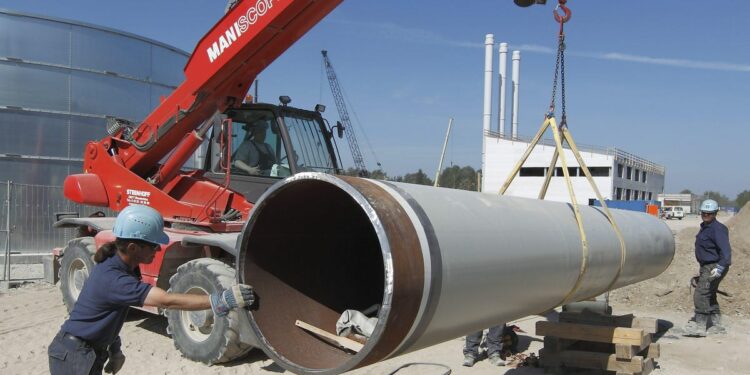Experts in any area often find references to things that ‘everyone knows’ which are simply not true and there seems little way to correct public knowledge. Jokes about aerosol sprays killing the ozone are still heard even though the CFCs were removed by Robert Abplanalp almost immediately after their impact on the ozone was discovered. Fitting, since he developed the CFC-powered can in the first place.
I mention this because Tuesday’s Wall Street Journal had two references—in a news story and an op-ed column—to Germany’s reliance on cheap Russian energy, specifically natural gas. This fits into the standard belief that cheap energy created the Industrial Revolution and ‘the easy oil is gone’ as the peak oil crowd used to say, meaning the days of easy growth are over. But all three of those are effectively wrong.
First, the Industrial Revolution exploited fossil fuels but it was the ability to transform them into usable heat and especially motion that allowed the progress which occurred. The steam engine, not coal, was the prime mover and in fact it enabled the production of greater amounts of coal by powering pumps that drained water-logged coal mines. Further, the concept that the ‘easy oil is gone’ developed when oil prices rose—just as Gulf War II started and the Venezuelan oil industry fell into turmoil. In a sense, the statement has some validity, but not because humanity used up the easy oil but because it was withdrawn from the market by various political actions.
These misconceptions are presumably behind the notion that the price of Russian gas to German was ‘cheap.’ How else to explain their reliance on it? The reality, as the figure below shows, is that Germans have paid a high price for gas because their contracts linked its price to oil prices based on their respective energy content. As I’ve said before, this makes as much sense as linking the price of tea to the price of coffee based on their respective caffeine. Gas and oil are only substitutes to an imperfect degree, but so are coffee and tea (well, some would disagree).
This pricing clause, now increasingly abandoned, was originally due in part to the substitution of liquified natural gas for crude oil in power generation in Japan, but after the 1973 oil crisis, natural gas exporters began arguing that natural gas was as valuable as oil, or even more so. ‘Everybody knows’ gas is ‘better’ than oil and therefore should have a higher price. In fact, M.I.T. economist Henry Jacoby once said he began his energy economics course by explaining why that simply wasn’t true.
The evidence can be seen in the above figure: U.S. natural gas prices rarely parallel oil prices even though many assume they should. For one thing, there is no world gas market that causes prices to equilibrate the way there is for oil—or coal, wheat, lobsters, etc. The cost of gas transportation means that prices in an exporting country are usually going to be much less than in an importing country. If gas and oil were perfect substitutes, whenever one was cheaper than the other, consumers would switch, causing the two to converge again. That doesn’t happen because you can’t easily use natural gas in automobiles and you rarely switch to oil in stationary uses like power generation because natural gas in the U.S. is almost always cheaper than oil.
It is true that Russian gas is cheaper to produce and transport than liquified natural gas from the U.S. or the Middle East, but the prices don’t reflect the cost of producing and delivering the gas. Russian gas is probably far more profitable than LN
LN
G, but to a German user, that is irrelevant.
The other major factor behind German use of natural gas is the decision in the 1970s that oil from the Middle East was unreliable and should be avoided at all costs, or almost all costs. Thus, Europeans bought natural gas from Algeria, Libya and Norway at prices that were linked to oil which meant that in an oil crisis, they were not spared from higher energy prices. This was due to the fallacy that energy crises were about an absence of physical supply, not because of higher prices. Indeed, heavy industry in the U.S. has been benefitted from nearly always having cheaper gas than Europe and Japan, not because the government somehow arranged for abundant supplies.
The concern now would be that Europeans would seek out expensive replacements for Russian gas, which are not necessarily more secure. Gas from Algeria, Australia, Nigeria, and Qatar is probably more secure than Russian gas, but hardly without risk. Even American gas is not perfectly secure: if fracking is banned, LNG shipments will rapidly drop to zero. (My 2020 EPRINC report shows the impact: The Impact of a Fracking Ban on Shale Production and the Economy by Michael Lynch – EPRINC)
Still, Russian gas will almost certainly suffer from the same consumer resistance that led demand for OPEC oil to drop by 15 mb/d from 1980 to 1985, as OPEC became the ‘supplier of last resort.’ But the need for massive infrastructure to sell natural gas means that they can’t simply reroute their surplus to new markets, even where demand exists. Of course longer term, more Russian gas will surely go to China, displacing coal, which would actually be a good thing. The law of unintended consequences doesn’t always produce negative results.











